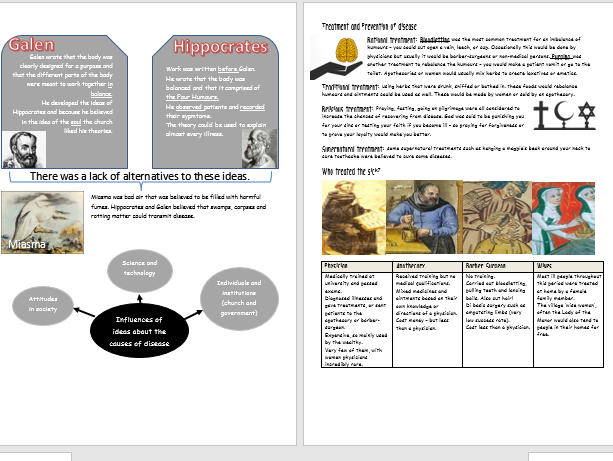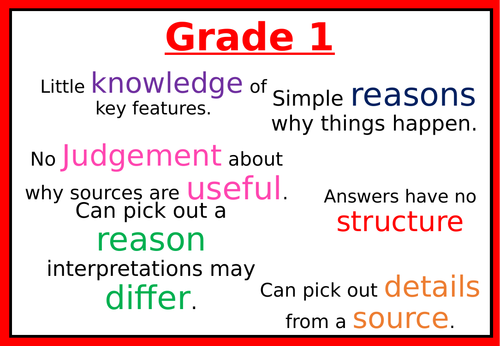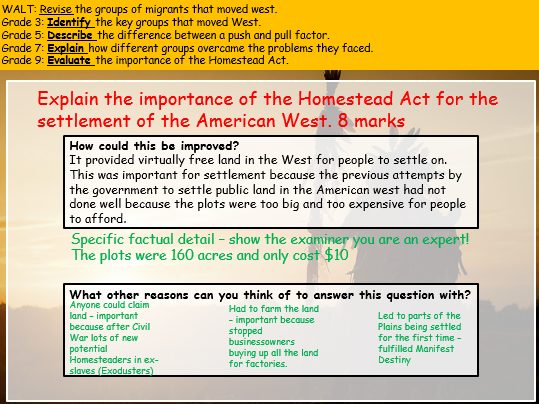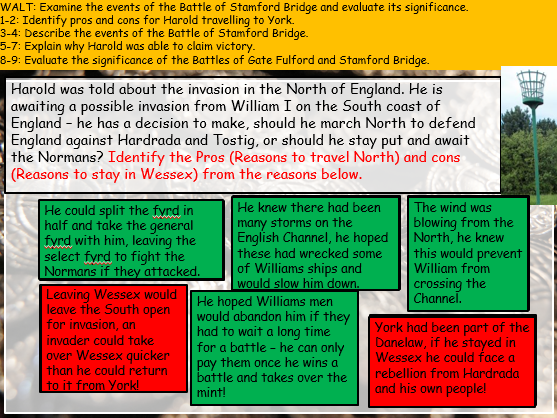
177Uploads
75k+Views
23k+Downloads
All resources

Medicine Through Time Revision Activity Book (designed for Edexcel 9-1)
Revision booklet with:
Knowledge checker (RAG rated)
input of knowledge for each section laid out appealingly
tasks at the end of teach unit - 10 ideas of how pupils can revise, four key words to define and a quick quiz (answers in the back)
source (strengths and weaknesses) table at the back of the booklet

Submission of the Earls 1066 - Normans (Edexcel history 9-1)
Whole lesson, fully differentiated with worksheets.
The final task asks pupils to compare answers against success criteria to mark and then improve two weak 16 mark answers,

PSHCE British Values
PSHCE lesson that explores the Ofsted framework for British Values. Taught to year seven, fully differentiated with gap fills and challenge tasks.
Pupils create a poster at the end to be displayed in tutor rooms so that you can show that they understand what BV are.

Grade Descriptors Edexcel History Display
Display created to inform pupils what is required for the new specification. goes from 1-9, I used the specification grade boundaries to create this display, the wording for g8-9 was identical which is why this grade boundary has one page rather than two.

Elizabethan England: Who was Elizabeth I?
Introductory lesson aimed at KS3 that builds GCSE skills of describe two features and how useful.
Lesson is fully differentiated with worksheets within the powerpoint as hidden slides.
Pupils green pen exam responses to develop understanding of what good writing looks like, pupils are given the opportunity to work up to a level 6 and all tasks are signposted and fully differentiated to support pupils to make good progress.
Task one: Describe what England was like in 1588 (describe two features exam question)
Task two: Explain why people would like/dislike Elizabeth
Task three: How useful are portraits of Elizabeth to a historian?
Bundle

KS3 Henry VIII
Five lessons well resourced and researched to create a flowing scheme of work for KS3.
Each lesson is fully differentiated and includes options for SEN and LA pupils as well as challenging HA+. Pupils enjoy these lessons because they link back to prior knowledge they may have attained through primary school, activities include creating facebook conversations, carousel tasks and levelled extended writing, of which could be marked formally if you so wish.
All lessons available to buy singularly for £2-£3 on my TES shop.
There are some lessons missing from the SOW as a whole because I hadn’t made the other lessons from scratch, for example you may want to include lessons such as the dissolution of the monasteries, pilgrimage of grace, and others.

Who moved West? Revision session American West Edexcel 9-1
Revision lesson designed to last one hour. Homework included that analyses the Oklahoma Land Rush and gives pupils a choice of three exam questions - narrative, consequence or importance.
Pupils:
define push and pull factors and explain why people moved west
analyse a timeline of key features of the migration west
describe the Mormon migration, Exoduster movement and Donner Party
Analyse the importance and the consequences of the Homestead Act

Government Actions Timeline 1830-95: REVISION American West
Revision lesson based around building knowledge of government Acts and Treaty’s
Pupils create a timeline using either worksheets or carousel (both options included).
They colour code key features and consequences so that it is easy to revise from.
Time permitting, pupils can then write exam questions that relate to the information they have studied SAMS questions included as examples to talk through with the group.
Homework could then be to complete one of these questions.

REVISION Saxon England (Anglo-Saxon and Norman England (Edexcel 9-1))
This revision session is part of a series of sessions aimed at building pupils knowledge and understanding of the Anglo-Saxon and Norman England unit for Edexcel 2016 specification.
As part of this session pupils will gain an overview of:
Saxon society
Edward the Confessor and the kings power
Law and order
Economy
Power of the House of Godwin
The Normandy Embassy
The Revolt against Tostig 1065

KS3 Invasion of Poland (WW2) Narrative account lesson
Pupils will explore the invasion of Poland with the aim of creating a GCSE style narrative account in preparation for the skills needed at KS4.
Pupils will:
examine the Munich Agreement and hypothesise how peopl e would react to it
Watch a video of the invasion and collect notes to be able to describe the invasion
Put the events of the invasion into chronological order using visual prompts for support
create a narrative account using a GCSE support sheet that allows development towards explaining why events lead to one another and cause change.

The Power of the Godwin Family and Normandy Embassy (Anglo-Saxon and Norman England (Edexcel 9-1))
WALT: Evaluate the power of the Godwin family.
2-3: Recall key facts about the Godwin family.
4-5: Describe the importance and power of the Godwins in England.
6-7: Explain what happened during Harold’s embassy to Normandy and why it might cause problems.
8-9*: analyse how useful Norman sources are to a historian.
Pupils examine the power of the Godwins and how their influence both helped and hindered Edward’s rule
They then explore the Normandy embassy using the Bayeux tapestry and the Norman and Saxon interpretation of the event.

The Battle of Stamford Bridge (Anglo-Saxon and Norman England (Edexcel 9-1))
WALT: Examine the events of the Battle of Stamford Bridge and evaluate its significance.
1-2: Identify pros and cons for Harold travelling to York.
3-4: Describe the events of the Battle of Stamford Bridge.
5-7: Explain why Harold was able to claim victory.
8-9: Evaluate the significance of the Battles of Gate Fulford and Stamford Bridge.
Pupils evaluate whether Harold should have travelled to York before watching a video that examines the events of Stamford Bridge (Video worksheet included) they then explain the main reason that they think Harold won the battle before evaluating the impact the battle may have on the Battle of Hastings.

The Lean Years 1924-28 (Weimar and Nazi Germany: Edexcel 9-1)
WALT: Evaluate why the Nazi Party only received 2.6% of the vote in 1928.
Identify the meaning of the phrase ‘ Lean Years’.
Describe features of the period 1924-28.
Explain why circumstances in Germany lead to little support for the Nazis.
Evaluate why the Nazi Party only received 2.6% of the vote in 1928.
Starter: Pupils complete a freya model with the meaning of 'lean years’
Task one: Describe features of the period 24-28 - pupils complete a carousel task, differentiated worksheet and answer sheet provided
Task Two: Explain why circumstances in Germany lead to little support for the Nazis (see cover photo for activity), WAGOLL and answer slide provided to go through with pupils
Task three: Evaluate why the Nazi’s received 2.6% of the vote: Explain why exam question with sentence starters for PEEL structure.

Weimar Germany The 'New' Woman
Fully differentiated lesson about the New Woman in Nazi Germany
Students will:
WALT: evaluate how far women’s lives improved in the 1920s.
Identify visual changes to women by 1925.
Describe how areas of women’s lives changed.
Explain how society reacted to these improvements for women.
Evaluate how far you agree with a statement.
Students complete the screenshotted task before analysing a how far do you agree statement using a ‘agree’o’meter’.
Students are also given the opportunity to look at source work and analyse whether the changes were positive or negative for women.

REVISION Rebellions and exam skills (Edexcel 9-1: Anglo Saxon and Norman England)
WALT: Revise the rebellions against William and evaluate how big of a threat they made towards his reign
Identify reasons people were upset with William’s leadership
Describe each rebellion.
Compare rebellions to explain how William responded to each threat.
evaluate how far you agree with a statement to come to a clear judgement
As with all of my revision lessons the worksheets cover all tasks so that pupils do not require their exercise books.
Task one: what did people have to be unhappy about?
Task two: Video task
Task three: line task (pictured as cover image) alongside information sheet to help pupils remind themselves of key content.
Task four: Exam question from past paper fully planned on slides to support pupils

REVISION Keeping Control (Edexcel 9-1: Anglo-Saxon and Norman England)
Session designed to revise the key theme of Norman Control after the Battle of Hastings. As with all of my revision lessons this is fully resourced and fully worksheet based so that exercise books/lined paper are not required.
WALT: Revise and explain how William kept control of Norman England.
WILF 1: Identify methods William used to keep control of England.
WILF 2: Describe five methods of control and Explain at least three in detail.
WILF 3: evaluate why William was able to keep control of England and apply knowledge to a 12 mark Q
Starter: identify 5 methods of control using the image (Exam 4 mark question as challenge)
Task one: create the feudal system and compare it to the saxon heirachy. (answers of similarities and differences on slide)
task two :video task (5 minutes)
task three: using the information sheet and own knowledge complete the mind map (see cover photo)
task four: 12 mark control exam question - can be set as homework.

WW1 knowledge and how useful intervention (Edexcel 9-1: WW1 medicine)
WALT: Revise key aspects of WW1 and evaluate the utility of sources.
Identify the chronology of WW1 battles.
Describe the chain of evacuation.
Explain how useful a source is.
Evaluate source utility including content and provenance, use and limitations.
Starter: Put battles into chronological order - AFL slide with key features of each battle
Task one: Create a paper chain of the chain of evacuation, include the key features of each chain - AFL slide with answers
Task two: How useful question - guided annotation of sources, exemplar answer for source A and then complete source B independently

REVISION Life in Nazi Germany/Control (Edexcel 9-1: Weimar and Nazi Germany)
This lesson, like all of my revision lessons, is fully resourced so that pupils can work fully on worksheets - not requiring any exercise books or lined paper.
WALT: Revise how Hitler controlled Germany.
Grade 3: Recall key facts for Paper Three
Grade 5: Describe key features of Hitler’s Germany.
Grade 7: Explain how Hitler kept control of the population of Germany after 1933.
Grade 9: Evaluate the most important method Hitler used to keep control of Germany.
Starter: Quiz
Task one: Carrot and stick donkey - what does it mean? how does it link to paper three?
Task two: overview/sorting activity - support on the slide for pupils plus using own knowledge, answer slide provided
Task three: annotate interpretations together
Task four: why do interpretations differ/what is the main difference (full mark wAGOLLS provided)
Task five: plan for a 20 mark interpretation question - can be set as homework, challenge to write conclusion (see cover photo for task in full)

REVISION STARTER ACTIVITIES: Entire unit quizzes American West, Edexcel
These quizzes have been designed as 5, 4, 3, 2, 1 tasks to drop into other lessons.
The idea is to use them as a way to interleave prior knowledge into current topics and ensure that knowledge is returned to frequently to develop knowledge retention.
The 5, 4, 3, 2, 1 structure gives students instant formative assessment in which they can then choose a topic to ‘pledge’ to revise that week as part of their homework. Every quiz has a green pen slide with answers to go through with students to support the teacher.
Students find these tasks very fun and engaging and can see where their strengths and weaknesses across a topic lie.
I have designed the task to revise important concepts briefly at least once by the time they have completed all of the starter activities. The activities could also be used as a building block to help students identify what they will be doing for the rest of the lesson (to be used closer to exams when completing revision tasks).

Civil Rights Movement: Education (KS3)
WALT: analyse and explain the importance of events for the fight for equal education.
Level 3: Identify key features of a source
Level 4: Describe key features in the fight for equal education.
Level 5: Explain the importance of key events for the fight for equal education.
Level 6: create a narrative account analysing the events that lead to equal education
Starter: describing a source
task one: recall Jim Crow Laws (taught in introduction to the Civil Rights Movement lesson)
task two: Video about Brown V Board
Task three: Video about Little Rock Nine
Task four: GCSE style question Explain the importance of Brown V Board for the fight for equal education. (green pen slide included see cover photo)
Task Five: Create a narrative account analysing the fight for equal education 1870 – 1972.
worksheet provided to support LA students




















